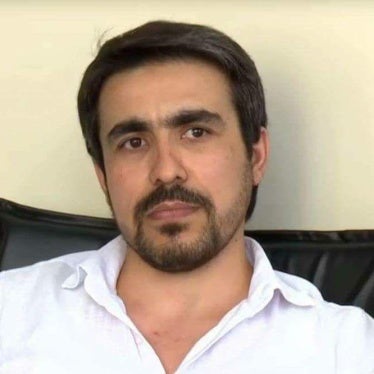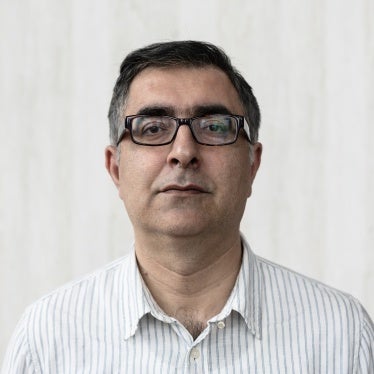Ramil Usubov
Minister of Internal Affairs
Ministry of Internal Affairs
7 Husi Hadjiyev Street
Baku, Azerbaijan
We very much value the engagement on human rights concerns that Human Rights Watch has had with you and your government for so many years.
I am writing to express profound concern about the civil libel case brought by the Ministry of Internal Affairs against Leila Yunus, director of the Institute for Peace and Democracy, a nongovernmental human rights organization. I urge that you withdraw the complaint against Ms. Yunus as the statements made by her that apparently form the basis of the libel accusations fall fully in the realm of protected speech. A judgment against Ms. Yunus would set a very poor precedent for freedom of expression in Azerbaijan.
The Ministry of Internal Affairs' complaint derives from an interview Ms. Yunus gave to Day.Az, an internet news provider, about the trial of several men charged with the 2005 kidnapping of two young sisters.
Ms. Yunus' organization had been monitoring the trial of these men, at the request of the girls' parents. According to Ms. Yunus, during the investigation and at trial one of the accused, Tavakkul Ismailov, confessed to the crime and said that they had handed over the kidnapped girls to a head officer in the local police department for the purposes of their further trafficking. We understand that at trial Mr. Ismailov also said that police tortured him in order to compel him to withhold testimony about the alleged police involvement in trafficking. According to Ms. Yunus, the trial judge at first ignored requests to have the relevant officials questioned in court.
In the Day.Az interview, published on December 3, 2008, Ms. Yunus calls attention to the fact that the accused officer was not summoned to be questioned at trial right away, and that the defendants' accusations of torture in custody were ignored. She also notes one or two other aspects of the case. Regarding these issues, in the interview Ms. Yunus only re-stated what was said in the trial hearings, which were open and therefore in the public domain. Later in the interview she made a brief comparison to police practices in Mexico and Nigeria. She also notes in the interview a prior kidnapping case in which several Ministry of Internal Affairs officials, including the deputy minister, were found guilty and sentenced to lengthy prison terms.
The Ministry of Internal Affairs's claim against Ms. Yunus states that in making the above statements Ms. Yunus insulted the Ministry of Internal Affairs groundlessly during a time that an investigation was not finished and that the comparison of the country's police to Mexico and Nigeria's police caused moral damage to the "professional reputation of the police," and was "not confirmed by official sources."
Ms. Yunus' statements in regards to the kidnapping case itself, only repeated what was said during court testimony by the defendant, during an open trial hearing. Since to the best of our knowledge Azerbaijani law sets out no limits on how individuals may use information gleaned from open trial hearings, it is not clear how repeating statements made by participants in such hearings can be actionable under libel. Ms. Yunus's comparative reference to police practices of other countries was an expression of her opinion, based on the experiences related to her by a colleague. It is not at all clear why information about these country's practices would have to come from "official sources" or why Ms. Yunus is not free to express her view about how these practices compare to those of the Azerbaijani police. Finally, in a discussion about a kidnapping case in which a defendant is alleging official involvement it is relevant and of public interest to make reference to the conviction of the two Ministry of Internal Affairs officials. All of the statements referenced in the Ministry of Internal Affairs' claim are protected speech by her right to freedom of expression, as enshrined by Article 10 of the European Convention on Human Rights and Article 19 of the International Covenant on Civil and Political Rights, to which Azerbaijan is a party.
The claim of insult of the police as a class does not fit the usual definition of libel; given that libel is primarily an offense that damages the reputation of an individual. Moreover, as has been said repeatedly by the European Court of Human Rights, public servants are expected to be more tolerant of criticism than private citizens, especially when it concerns the carrying out of their official duties. We would strongly suggest that it should be rare, if ever, that the Ministry of Internal Affairs itself should be able to bring a case alleging that it had been libeled.
We are aware that often strong criticism or allegations by human rights or other civil society organizations regarding abuses by government officials are not welcomed by the relevant authorities. However, raising public awareness through legitimate criticism is an appropriate part of human rights work, which in turn is aimed at improving adherence to international standards and the rule of law and at ensuring that the government holds accountable those officials responsible for abuse. The European Court of Human Rights has also upheld the right of interested parties to report and comment on matters of public interest, including on court cases that are not yet concluded. The possible involvement of police officers in trafficking is clearly a matter of public interest.
We therefore request you to withdraw the claim against Ms. Yunus immediately. Thank you for your attention to this matter.
Sincerely,
Rachel Denber
Acting Director
Europe and Central Asia Division








